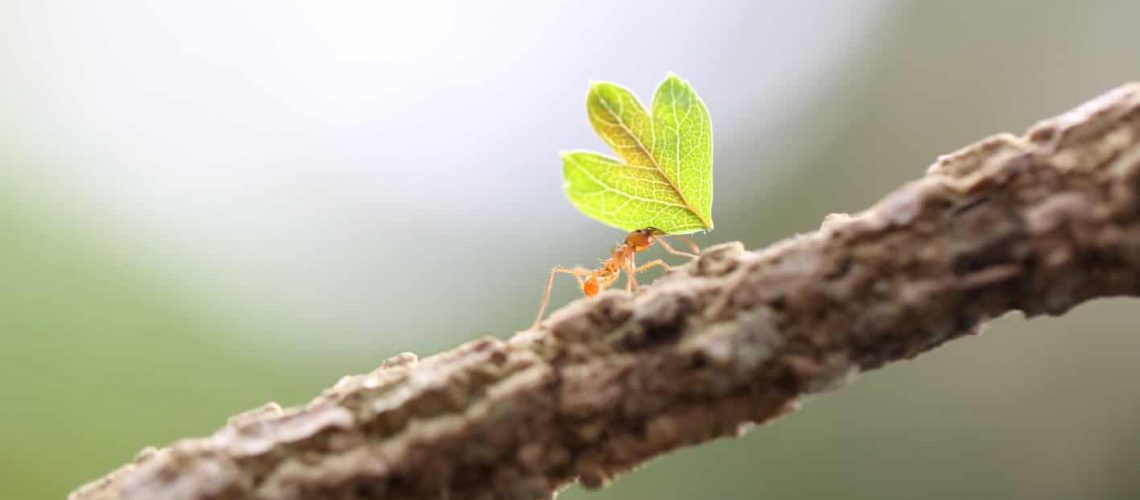It might not be common knowledge, but garden ants commonly eat an assortment of food. However, what does that assortment entails? Should it concern you, and do their eating pattern tends to turn from a non-issue to a nuisance for you?
What do garden ants eat?
Garden Ants have a preference for sweet things. This makes them very fond of honeydew from aphids and sweet and sugary things that can be found in the kitchen. They can also leave a trail for other ants to find the right source of food.

Lasius Niger, the black garden ant, is formicine and is mostly found in Europe, some places in North America, South America, some parts of Asia, and Australia. Whether you’re looking forward to knowing about the most active months of the garden ant or the main signs of their presence, here’s all the information that you will ever need about them.
Do garden ants need proteins in their diet?
The garden ants in an ant colony live on sweet and sugary stuff. However, the same can’t be true for the queen ant and the larvae. They need protein in their diet as well. This protein can be provided in the form of fruit flies, mealworms, crickets, beeps, beetles, or even eggs. If you form a colony of garden ants, you should be more than careful of the things you are feeding them.
Feeding poisonous stuff like some peel of sprayed fruit can be harmful to them. If you are catching your insects to feed your garden ant, then due diligence is required. It can be performed by boiling those insects before you feed them to garden ants to avoid the transfer of any kind of disease or parasite.

Are garden ants, with their eating habits, friends or foe to your garden?
It is quite hard to give a satisfying answer about garden ants being a friend or not. They lie in a somewhat grey area, so it becomes rather difficult to conclude their friendliness or adversary nature. Here are some of the pros and cons of having garden ants.
Natural controlling of pests
With garden ants in your garden, you will never have to worry about pests like lady beetles, green lacewings, or any other bugs. You might be surprised to know that many people introduce garden ants in their garden as a part of their pest management strategy.
Improvement of pollination
Garden ants can be an apt description of the concept of hand pollination. They move from plant to plant in search of food and can act as unintentional pollinators.
A healthy ecosystem
In traditional gardening, ants can be a major source of help in aerating the soil. They will dig tunnels, carry water and oxygen, and even nutrients to plant roots. They can also play a major role in speeding up the decomposition of organic material – leaves and dead insects.
Increase in the pest population
If you have had the pleasure of dealing with a spilled can of drink on the sidewalk or outside, then you have witnessed the increase in the pest population.
Much like human milk cows, garden ants also farm and protect aphids so that they can milk “honeydew” from them.
Pain and property destruction
The carpenter ants in your garden can sting, and it will be a painful experience. Additionally, they like making a home in the wood. Unfortunately, they can’t differentiate between a decaying piece of wood and your house. In retrospect, that can cause a big problem.
What is the preferred colony temperature for a garden ant?
Garden ants like to stay a little over the warm side. It means that the temperature of the nest ranging between 20 – 27 degrees will be ideal for them. An easy trick to maintain said temperature is to install a heat lamp. However, you should be careful not to heat it enough that it may cause the ants to burn to death.
A cool trick would be to heat only a designated area of the nest. It will give ants the option to pick whichever side they want.
What is the right moisture level for garden ants?
Garden ants are not fragile creatures, but they still need some level of moisture in their nest to continue living. A moisture level varying between 10% – 50% will be a decent level for them. There is a possibility of garden ants dying from extreme dryness so take necessary measures to prevent extreme dryness.
You can maintain the moisture by spraying with a garden spray bottle and a good balance of dirt and sand to bind the moisture. You can also try experimenting with a piece of wood to be successful in getting the right moisture condition.
What is the hibernation period for garden ants?
Garden ants are most active in the summertime, and they hibernate during the wintertime. They are not used to being active in the winter months. During the wintertime, the garden ant will prefer to stay in their nest and wait till the spring season is there.
Garden ants require this hibernation period to remain fit and healthy. Additionally, they also don’t require any feed during this hibernation period. Their hibernation period starts in October and ends around March.
What is the time for their mating flights?
Ants mate on the wings, so the flying ants are known as alates, i.e., reproductive individuals. These contain a male and females are the virgin queens.
The mating time for garden ants varies as per their location. So the garden ants in North America have their mating period in autumn. Whereas, for the garden ants in Europe, their preference with mating period lies in the hot summer months of July and August.
Enjoy the presence of garden ants in your garden
Garden ants are an active and aggressive species. They can be counted as scavengers with a more specialized diet. Their eating habits are more towards the opportunistic end – an insect being dead or injured is a happy sight. A good knowledge of their eating habits and making sure they are well-provided can keep them happy and your sugar stash safe and nicely kept away from them.

